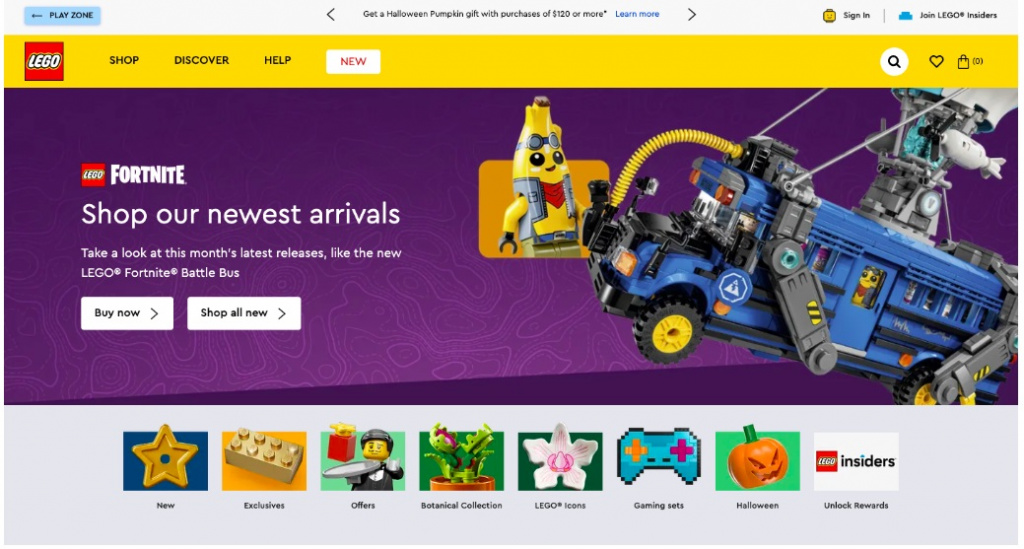LEGO's Website Compromised in Major Crypto Scam Attack
Updated: Oct 07, 2024 at 20:40

On the night of October 4, 2024, users of LEGO's legitimate website discovered a banner so bold that it warranted attention for all the wrong reasons: large golden coins emblazoned with the LEGO logo-this was a declaration of the "LEGO coin," and it was openly advertising for customers to buy into it, promising "hidden rewards" for the purchaser.
However, this was not an officially initiated campaign by the reputed toy maker. It was just a well-orchestrated cryptocurrency scam by hackers who hijacked the LEGO website. With rising interest in cryptocurrency conversions like USD to BTC, many may have fallen victim to this advertisement scam.
The cyber crooks redirected the "buy" button to an independent cryptocurrency website selling "LEGO Tokens" in Ethereum. That security breach flabbergasted the LEGO community, with many users of the LEGO subreddit blasting the genuineness of the news. Many quickly pinpointed their observations, pointing out a shabbily designed banner and jumbled text displayed before a weird juxtaposition of the LEGO and Fortnite logo that had nothing in connection with the unauthorized promotion.
Quick Action from LEGO Company
The better part is that LEGO responded quickly to the issue. The unauthorized banner disappeared quickly, and by the next day, there was a banner about the corporation's partnership with Fortnite on the site instead. Through an official statement published on its side to Engadget, LEGO informed its customers that it was safe and sound as their accounts were not infiltrated, so they were free to shop around. The company further stated that it can trace the breach and initiate measures to prevent such occurrences, although it did not disclose details of these security upgrades.
On 5 October 2024 (October 4 evening in the US), an unauthorized banner briefly appeared on LEGO.com. This has been removed, and the issue is resolved. No user accounts have been compromised, and customers can continue shopping as usual. We have identified the cause and are taking measures to prevent this from happening again."
Implication of Hack
While the immediate risk to consumers is slight, the incident does raise some serious concerns about online safety and consumer confidence. In such a scenario, hackers may log in to the LEGO website, which points to an even more profound weakness many online sites are exposed to today. Even though LEGO said no customer data was accessed, the fact that such a scam occurred does seem to have an erosion effect on consumer confidence.
To most customers, LEGO is a quality and integrity brand. The idea that their favorite retailer could become a victim of such a hack might scare some customers away from shopping online. Other people will fear scams and will avoid the main LEGO website in favor of secondary markets that do not have the same level of security or authenticity guarantee.

Recognition of Online Scams
This, for example, has taught a few customers the precautionary measure of being safe from making hurried online purchases. The increase in the use of e-commerce is accompanied by advancements in the sophistication of committing online fraud. Indications of potential scams include low-quality graphics, vague communications, and hyperlinks that forward one to unverified websites. Notions like the LEGO banner presented all these and much more, starting from faceless AI-generated artwork to jumbled text.
Though this hack did not directly risk non-interaction customers, it still demonstrates the need for caution. Consumers should always verify the legitimacy of a product or offer before clicking links or making a purchase. In the case of LEGO, the company's reputation and intent on pleasing the customer invite almost no risk that they would establish cryptocurrency operations, given that most of their products are safe for families.
While LEGO has experienced this firsthand, it is not an isolated case, as many large and small businesses have experienced the threat of cyber attacks. Companies must take strong security measures and educate consumers about the potential dangers lurking in the digital sphere. While LEGO assures customers that it has taken the necessary measures to protect its website, the company's experience turns out to be a lesson for other brands.
The protection measures embraced by the consumer will be preemptive after the hacking and, more particularly, about avoiding all kinds of fraud. Keeping software updated, observing suspicious signs, and verifying advertisements help one ensure safety from the dark side of the Internet.
Now that e-commerce continues to boom, consumer education about best practices in buying online is an important objective. Be careful about clicking on suspicious links, and certainly not those that seem too good to be true. If it sounds too fishy or extremely promotional, dig deeper before acting.
Stay Vigilant and Protect Your Assets
Indeed, this particular scam, though serious, involves LEGO's breached website promoting a fraudulent cryptocurrency scam. The company's fast handling of the breach and dedication to enhancing customer security are more reassuring. As the brand expands into newer movies and creative products, its consumers and company must stay attuned to the online landscape.
Vigilance and awareness, therefore, now form the best defense against these cybercrime threats that evolve daily. Through this preventative measure and awareness, consumers can enjoy LEGO's creative world without succumbing to hackers.
Disclamer. This article is paid and provided by a third-party source and should not be viewed as an endorsement by CoinIdol. Readers should do their own research before investing funds in any company. CoinIdol shall not be responsible or liable, directly or indirectly, for any damage or loss caused or alleged to be caused by or in connection with the use of or reliance on any such content, goods or services mentioned in this article.
Price
Price
News
News
Price

(0 comments)